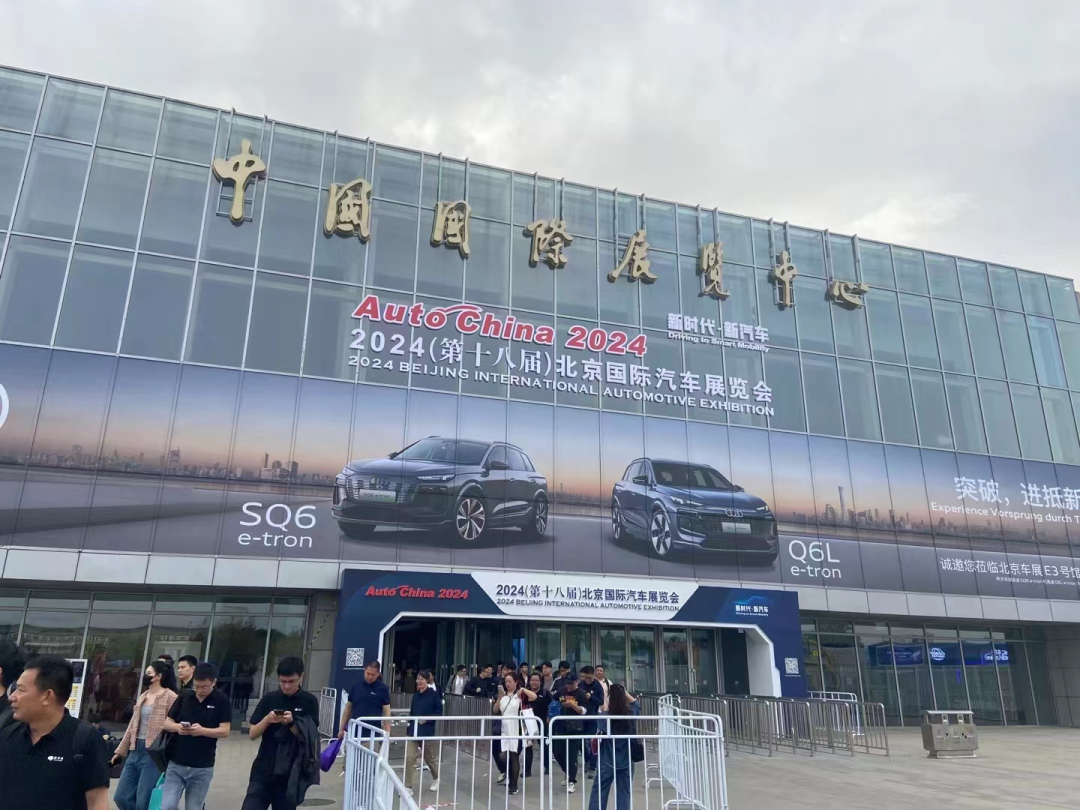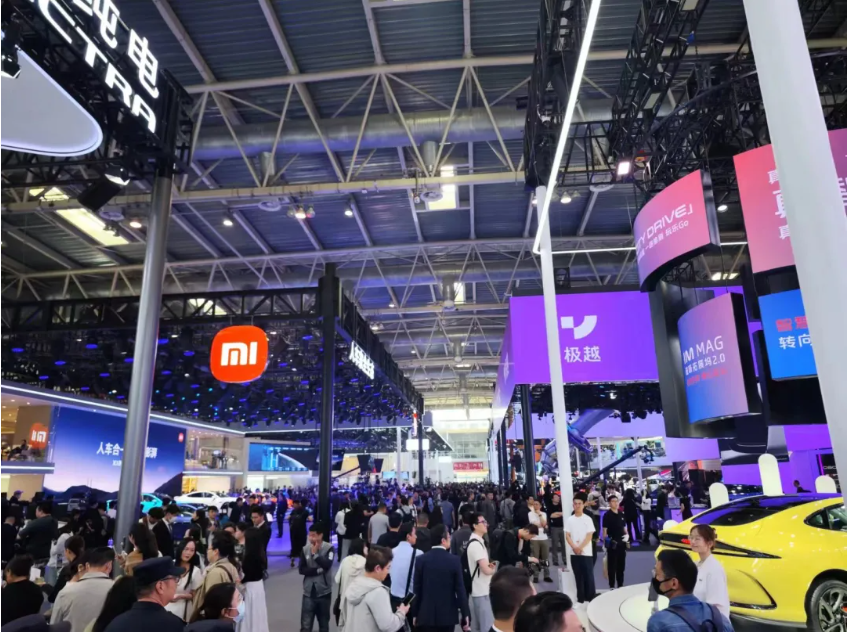
After a four-year break, 2024 Auto Beijing showcased 117 global vehicle debuts, including 278 new energy vehicles and 41 concept cars. The number of exhibitors and new car models has reached a higher record. China's automotive market has seen nearly a decade of corporate entry actions, with Xiaomi's car debut marking its final phase as few players are expected to enter in the short term. In the emerging market of new energy vehicles, traditional automakers, emerging forces in car manufacturing, and technology companies venturing into automobile production have formed a three-way competition pattern that is entering a final moment.
If new energy vehicles were gaining momentum at the previous Beijing Auto Show, they have now undoubtedly become the center of attention. At this stage, domestic brands have taken the spotlight. In 2023, sales of domestic brands surpassed those of overseas brands for the first time. In Q1 this year, domestic brands' market share continued to rise, reaching a cumulative share of 55%, an increase of 5.4 percentage points compared to the same period last year.

Besides the market and industry transformation, one of the changes at the Beijing Auto Show is the way to advertise. Car companies are now gaining attention not just through their products but also through alternative means. Lei Jun and Zhou Hongyi, have become "biggest fans" on the opening day of the Beijing Auto Show and even overshadowing numerous new cars.However, the Auto China 2024 seems to be renamed.
Fewer joint venture brand
In this auto show, domestic brands have once again intensified their efforts, not only by speeding up the introduction of new car models but also by continuously advancing in technology. Correspondingly, the exhibition booths of domestic brands are expanding to match the increasing variety of car models and technologies.
In contrast, the current joint venture brands are hard to survive. This is evident from their absence in the official announcement of exhibition booths and areas at the Beijing Auto Show, where Mitsubishi, Peugeot Citroen, Acura, Skoda, GAC Fiat and Jeep were previously present. Additionally, Toyota and Honda have also reduced their booth areas compared to previous shows.
According to data from CPCA, mainstream joint venture brands continued to see a decline in sales in March, resulting in a further reduction in market share. The retail sales of these brands reached 500,000 units, marking an 8% decrease compared to the same period last year. Recently, Wang Chuanfu, Chairman of BYD, pointed out that within the next three to five years, joint venture brands' market share would significantly drop from its current level of 40% to only 10%, while Chinese brands would occupy the remaining 30%.
However, joint venture brands are not abandoning the Chinese market. Mazda unveiled the new mid-size electric vehicle EZ-6 at this year's auto show in response to the growing trend of new energy vehicles. Infiniti also introduced its first electric model Vision Qe, Honda showcased their localized pure electric car e: NP2/S2, and the newly launched electric brand "Ye" made its official debut.


However, many new models including validated brands like Xiaomi, Jiyue, AITO, iCAR, FANGCHENGBAO, and Yangwang. Whether due to domestic brands' continuous efforts or increased investment from joint venture car companies, 2024 will bring even more intense and ruthless rounds of reshuffling and elimination.
“Throughput” is a double-edged sword
Lei Jun controls this car exhibition, with even Xiaomi's booth having to limit visitors. On the first day of the event, he visited BYD, Mercedes-Benz, Li Auto, NIO, BAIC Motor, GAC Motor, etc., attracting media and spectators wherever he went.
Another person, 360 Chairman Zhou Hongyi, sat in the Dongfeng Mengshi 917 at the car show, becoming a renowned highlight of the exhibition after announcing his decision to sell his long-time companion Maybach and switch to a domestic new energy vehicle.
Before the Beijing Auto Show, Zhou Hongyi announced his decision to sell his Maybach and switch to a domestically produced new energy vehicle, inviting everyone online to experience it. This news caused an earthquake in the auto industry, with major car manufacturers lining up to offer cars to Zhou Hongyi. The anticipation of which car will become the "Red-Clothed Uncle's" new ride has become one of the hottest topics online. Amidst all the excitement and celebration, Zhou Hongyi has emerged as a rising superstar in the automotive industry.
In this situation, top executives from automotive companies are now emulating Lei Jun by actively participating in marketing activities themselves. Yin Tongyue, Chairman of Chery Automobile; Wei Jianjun, Chairman of Great Wall Motors; An Conghui, CEO of Zeekr; and Zeng Yuqun, Chairman of CATL have all been frequently appearing at auto shows to promote their respective companies' products.
Several heads of automotive companies have told Car Research that they've realized how important traffic is in marketing, starting with Lei Jun's Xiaomi car. While car companies used to think the topic of traffic from new forces was unimportant, the huge influx brought by Lei Jun made them wake up. Now car manufacturers are saying they want to adapt to this market change and effectively use industry leaders' IP to communicate more with users and generate more topics.
However, the quality of cars is based on their products. Some industry insiders have expressed that the effects of throughputs may not always be sustainable and require further testing. What truly withstands the test of time is a brand's power, which includes its attitude, values, product strength, service, user experience, and reputation. " Throughputs should not solely be driven by capital but rather by allowing users and society to evaluate products based on their true understanding."
Intelligent competition
Besides the competition between joint ventures and independent brands, as well as the battle for market share, this auto show is officially themed "New Era, New Automobiles." Given the significant emphasis on intelligent design showcased during major brand conferences at this Beijing Auto Show, it is evident that car manufacturers universally consider intelligence crucial in competing for new energy vehicles.

GAC Group announced its "Smart Mobility 2027" action plan at the auto show, aiming to solidify three major technological foundations including the "GAC AI Big Model Platform" over three years. Xpeng Motors declared that its AI Tianji system will make its global debut, marking its comprehensive entry into the era of artificial intelligence. Zhang Jianyong, Secretary of the Party Committee and Chairman of BAIC Group made his first appearance at the Beijing Auto Show and openly stated that our future lies in an intelligent electric era with deep integration between intelligent connected vehicles and new energy vehicles.
The organizer also created a special 'Future Smart Driving Zone', where Huawei showcased its intelligent upgrades and collaborated with the HarmonyOS Intelligent Mobility booth to display smart electric vehicles.
Huawei launched its new smart driving brand "Qiankun" the day before the Beijing Auto Show, which includes upgraded solutions such as Qiankun Smart Driving, Qiankun Vehicle Control, and Qiankun Vehicle Cloud. In addition to Voyah and Mengshi brands adopting Qiankun Smart Driving technology and being released within this year, there will be a total of ten strategic vehicle models from Changan Deepal and Avatr, ARCFOX and STELATO, AITO, luxeed, and JAC's new brand that will also be launched.
Before this auto show, Changan Automobile announced plans to integrate Alibaba Cloud's Qwen-Max-0403 model in various aspects, with cabin interaction as the core application, for developing a large-scale model in the automotive field. This model will be applied to their upcoming flagship vehicle, Changan Qiyuan E07. Xie Lecheng, Deputy Director of Changan Technology AI LAB, stated: "The success of a car manufacturer's 'service-oriented' approach lies in implementing the large-scale model into their vehicles. Not every company can afford a dedicated team for large-scale model research; therefore, we need to choose good models and build independent agents on our platform.”
Japanese media represents to Car Research that the Chinese new energy vehicle market is a 'cross-border offensive' with successful smartphone companies now entering car manufacturing. The manufacturing expertise gained from smartphones will be quickly applied to the automotive industry. In the future, intelligence in new energy vehicles will inevitably become a new trend, and Chinese automakers are already leading in advancements.
To sum up, this Beijing Auto Show differs from previous ones. "Influencers" like Lei Jun and Zhou Hongyi have also encouraged car company executives to actively participate in marketing activities. The exhibition floor plan indicates the market share held by domestic brands.
However, it is worth noting that the participating car companies have a shared consensus on new technologies and directions. This also highlights the importance of addressing the issue of homogeneity. Effectively utilizing traffic and quality synergy rather than being overwhelmed by traffic will be crucial for distinguishing oneself in the second round of 'elimination matches'.
Translator:Wei Xiong
Reviser:Yan Luo

 Room 1104,Block B,JingBan Building,6 Middle Beisanhuan Road,Xicheng District,Beijing
Room 1104,Block B,JingBan Building,6 Middle Beisanhuan Road,Xicheng District,Beijing
 (8610)62383600
(8610)62383600
 quanqixiang@carresearch.cn
quanqixiang@carresearch.cn
 京公网安备:11010202007638号|京ICP备17032593号-2|Report illegal and bad information:010-65993545-8019 jubao@carresearch.com
京公网安备:11010202007638号|京ICP备17032593号-2|Report illegal and bad information:010-65993545-8019 jubao@carresearch.com
Legal support:Beijing Yingke Law Firm|All rights reserved, DO NOT reproduce without permission